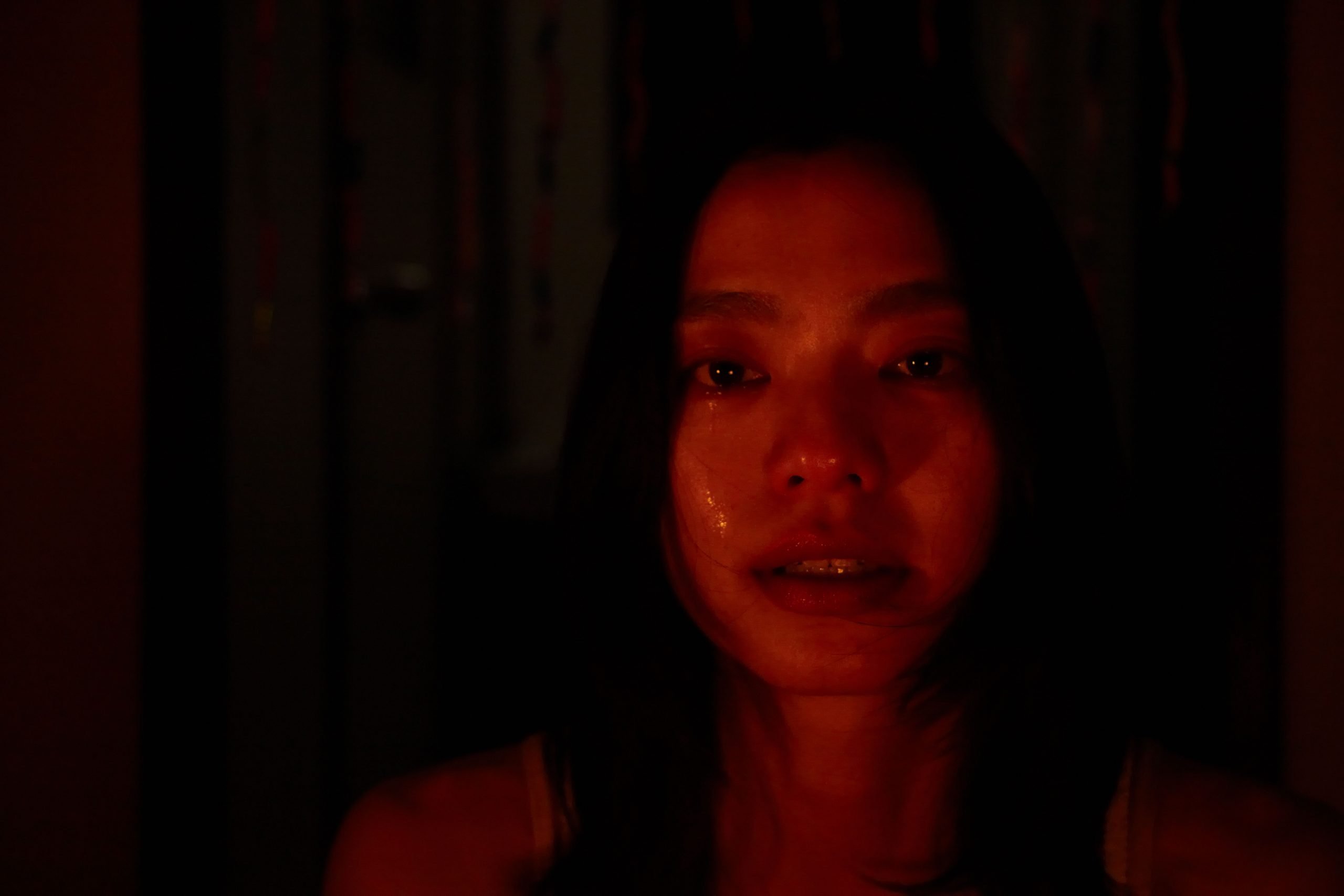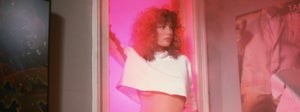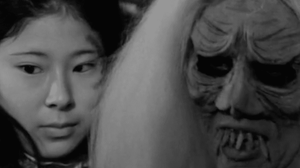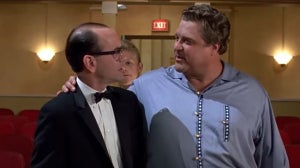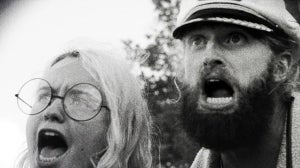
From the gentle melodramas of Yasujirō Ozu and the samurai epics of Akira Kurosawa, to the yakuza underworlds of Kinji Fukasaku and punk wastelands of Gakuryū Ishii, it’s easy to get lost in the rich history of Japanese cinema.
But what of the country’s modern films? Who are the new masters, and what are some of their finest works? To help answer these questions, listed below are some alternative highlights of Japanese cinema from this side of the millennium.
Visitor Q (Takashi Miike, 2001)
Takashi Miike is by far and away the most prolific Japanese filmmaker working today. With over one hundred directorial credits to his name, he’s tried his hand at every genre under the sun, from samurai and yakuza flicks to musicals and outright horror. In 2001, Miike produced one of his most arresting works, Visitor Q, a shot-on-video reinterpretation of Pier Paolo Pasolini’s Theorem (1968). The narrative tells the tale of a divided family visited by a mysterious figure who, through inexplicable methods, manages to bring them closer together. To call the film shocking doesn’t quite do justice to its jaw-dropping developments, some of which transpire in the first five minutes. Extreme, biting, and tinged with a playfully perverted humour, Visitor Q remains one of Miike’s most polarising yet essential works.
https://youtu.be/CRc6dN7s1w4?feature=shared
Blue Spring (Toshiaki Toyoda, 2001)
In Toshiaki Toyoda, we find one of Japan’s best and most controversial contemporary directors. His run of films from the late nineties to the mid-noughties is nothing short of astounding, the pick of an exhilarating bunch being the grimy high school drama Blue Spring. Teeming with palpable anger and rebellious sentiment, the film follows a group of jaded male students whose frustrations and growing pains steadily reach a violent boiling point. Frequent Toyoda collaborator Ryuhei Matsuda stars as stoic high school alpha Kujo, the apathetic leader of our troubled teens, whose personal journey is at the narrative’s heart. Bookended by an electrifying title sequence and an unforgettable climax, Toyoda’s unorthodox and abrasive coming-of-age film remains distinctly soulful.
https://youtu.be/CEjNMsAI1Tg?feature=shared
Summer Time Machine Blues (Katsuyuki Motohiro, 2005)
Makoto Ueda is one of modern Japanese cinema’s unsung heroes. The playwright and screenwriter has had a heavy hand in numerous time-bending tales over the years, penning Europe Kikaku’s indie hit Beyond the Infinite Two Minutes (2020) alongside anime adaptations for industry auteur Masaaki Yuasa. All cinematic roads lead back to Summer Time Machine Blues, Ueda’s cinematic re-telling of his successful stage production. Brought to life by director Katsuyuki Motohiro, the story follows the dumbfounded students of the sci-fi club, who get themselves caught up in light-hearted time-travel shenanigans one sweltering summer’s day. Among the usual thrills and spills is a deceptively simple plot that pays attention to the details and plays with time-travel tropes. Endlessly charming and stacked with loveable characters, the film demands multiple viewings to be fully appreciated.
https://www.youtube.com/watch?v=kOmFxd3QQ5E
Tokyo Sonata (Kiyoshi Kurosawa, 2008)
The career of director Kiyoshi Kurosawa is certainly varied. The one-time pinku eiga filmmaker has worked with shoestring budgets in the J-horror and V-cinema movements and, in recent years, has taken on more grandiose studio projects, becoming something of a critical darling. The internationally acclaimed Tokyo Sonata marked Kurosawa’s shift towards dramatic features and remains one of his best modern films. The director’s take on the archetypal Japanese family melodrama is unexpectedly gruelling, as the cracks in an already dysfunctional middle-class family deepen and are exposed in a scathing critique of contemporary working society. Infidelity, shame, and suicide, to name but a few topics, are all deftly explored by Kurosawa in what is a melancholic and uncomfortable yet unmistakably human feature with a profoundly moving finale.
https://youtu.be/lyWp__jXNRw?feature=shared
The Warped Forest (Shinichiro Miki, 2011)
A spiritual sequel to the unchained oddity that is Funky Forest (2005), Shinichiro Miki’s The Warped Forest is a comedic fever dream of sorts that must be seen to be believed. The director’s perversions are unleashed in full here, as tree-women bear suggestively shaped fruit and a local brothel caters to some highly unusual tastes. What might appear to be nonsense at first is, in fact, a fully realised world that’s brought to life by some wonderfully integrated special effects and committed performances from actors who understand Miki’s wild intentions. A pleasantly bemusing experience, The Warped Forest is the result of a filmmaker with a clear vision who got to make exactly what he wanted – something that should always be championed.
https://youtu.be/2FUeZDgI05k?feature=shared
Kotoko (Shinya Tsukamoto, 2011)
Over the past thirty years, Shinya Tsukamoto has consistently been one of Japan’s most experimental filmmakers. Away from the nightmarish visuals of Tetsuo: The Iron Man (1989) and the wartime horrors of Fires on the Plain (2014), Tsukamoto’s psychological thriller Kotoko makes a case for being his most disturbing film to date. We follow a young mother, Kotoko, whose violent and vivid hallucinations send her into a downward spiral of self-doubt that forces her to be separated from her son. Musical artist Cocco plays the titular protagonist to perfection, the star having also developed the story with Tsukamoto. The director brings his unmistakable brand of intensity to the visuals, delivering a disorienting and abstract experience that lives long in the memory.
https://youtu.be/CyhCf6Eifeo?feature=shared
After the Storm (Hirokazu Koreeda, 2016)
It’s impossible to discuss modern Japanese cinema without touching on the beloved Hirokazu Koreeda. The Palme d’Or winning director is renowned for his gentle family melodramas, most featuring characters so close to reality that they could step right out of the screen. His 2016 film, After the Storm, is no different, as we follow Ryôta (Hiroshi Abe), a divorced and disinterested novelist battling demons past and present while trying to reconnect with his son. It all sounds horribly bleak, but Koreeda, as he so often manages to do, finds chinks of light and warmth in this introspective tale that explores parental failings, lost dreams, and the importance of living in the now. Typically, everything is brought together with great compassion by a director gifted in his understanding and depiction of everyday people.
https://youtu.be/-1ccqfyyVfg?feature=shared
Hanagatami (Nobuhiko Ôbayashi, 2017)
Japan has a long history of anti-war cinema, with one of the best modern examples being Nobuhiko Ôbayashi’s masterpiece, Hanagatami. The late director, best known for the outrageous horror-comedy House (1977), boasts a varied filmography and a unique stylistic approach that is essential to the charm of his work. A passion project some forty years in the making, Hanagatami is a colourful and heart-warming coming-of-age film overshadowed by the tragedy of war. Set in a small coastal town in 1941, we follow the ambitious Toshihiko (Shunsuke Kubozuka) and his optimistic friends as they lose themselves in the innocence of youth while the inevitable chaos of the Pacific War draws ever closer. A visually stunning and greatly romanticised anti-war epic, Hanagatami stands as one of Ôbayashi’s most important films.
https://youtu.be/zca3OLKMF8Q?feature=shared

Related Articles


